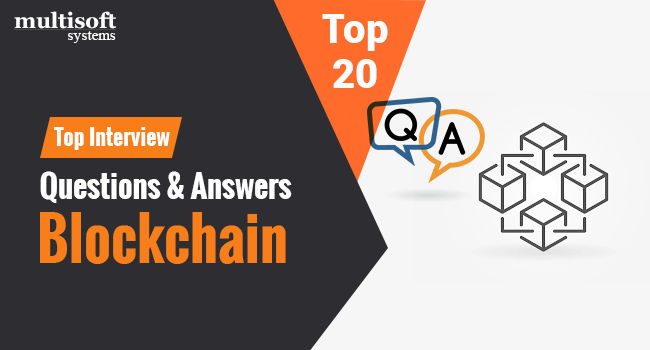Blockchain, invented by Satoshi Nakamoto in 2008, is designed in a way that it enables the users to modify the data. It is a growing list of records, known as blocks, that is linked with cryptography. We have presented an advanced set of Blockchain interview questions and answers for working professionals and graduates.

- What is a blockchain system?
This technology, featured with high immutability and secured by numerous nodes, enhances the capacity of the complete network. It enables the enterprises to store data in a network which further retrieved via internet.
All the aspects and features, including consensus algorithm and cryptographic functions, associated with Blockchain refer as Blockchain system. There is a massive variety of Blockchains having different properties and qualifiers. These things make us understand the characteristics of Blockchain.
- What is Blockchain technology?
Cryptocurrencies have become an essential part of business transactions. As data is permanently stored in this technology, it ensures a safe, recorded, and immutable transaction. It also uses reliable currency exchange platforms that ensure secure transactions. User identities remain hidden on Blockchain, and one can access Blockchain data only by his/her private key. Blockchain is governed by its coding, and it cannot be changed once recorded.
- Which are the different types and pillars of Blockchains?
Blockchain has three different types as Public, Private, and Consortium. You will get to know the details of all these types in details after pursuing the Blockchain Training. However, Decentralization, Transparency, and Immutability are the three key pillars of Blockchain Technology.
- What is distributed leader technology?
A distributed ledger is nothing but its name suggests, and the distributed leader technology is a broad category of Blockchain technology. This technology helps in maintaining digital record accurately and uses many participants in a single network. However, a distributed ledger is supplemented with cryptographic functions by Blockchain technology.
- What is a Blockchain wallet?
A Blockchain wallet enables the user to access his/her digital assets and transfers cryptocurrency securely. It escorts node hosting and stores cryptocurrencies on the user's computer. However, the safest place to store digital assets is offline, which is also known as “cold storage.”
- What is blockchain programming?
Blockchain programming focuses on security and cryptography. As the new technologies need these programmers to use global digital networks, programmers have shifted to the Blockchain space.
- What is the blockchain software?
Bitcoin, a Blockchain software, was released as open-source software. As it is like any other software, anyone can use and change it. Many approaches were made across the Blockchain ecosystem to modify the original Bitcoin's software. Ethereum has its own open-source blockchain software. However, some blockchain software is proprietary and not available to the public.
- What is the Blockchain database?
Blockchain network consists of a large number of distributed nodes, and the voluntary participants must reach consensus and maintain a single transactional record together. A sole authority manages the client-server architecture associated with the databases. However, the decentralized architecture of the Blockchain database is used to deal with the weaknesses of many centralized architectures.
- What is the Blockchain application?
Even though the applications implement the decentralized architecture and cryptoeconomic systems, these applications are compared to traditional software applications. These are used to promote trust and increase security. Earn
Blockchain Training in Noida to know about the widely used applications. Some of the Blockchain applications that are beneficial for local communities and multinational enterprises are Distributed Cloud Storage, Networking and IoT, Notary, and Digital Identity.
- Which are the key employment areas for Blockchain professionals?
A Blockchain professional can work as Blockchain Development Executive, ICO Development Executive, Blockchain Expert, Blockchain Generalist, Enterprise Blockchain Professional, Blockchain Consulting Executive, DApp Development Officer, Wallet Development Officer, Hedera Hashgraph, Cryptocurrency Development Officer, Senior software engineer (cryptocurrency), Cryptocurrency Developer, Cryptocurrency Analyst, Cryptocurrency Trader, Cryptocurrency Research Analyst (Internship), Cryptocurrency Mining Technician, Direct Sales Associate (Cryptocurrency), Bitcoin Full-Stack Developer, Systems Engineer (Trading Cryptocurrency), and Cloud Engineer with Bitcoin protocol/Blockchain.